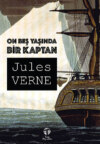Kitabı oku: «The Voyages and Adventures of Captain Hatteras», sayfa 15
CHAPTER XXXI
THE DEATH OF SIMPSON
They resumed their journey; the mind of every one was filled with new and unexpected ideas, for to meet any one in these regions is about the most remarkable event that can happen. Hatteras frowned uneasily.
"The Porpoise!" he kept saying to himself; "what ship is that? And what is it doing so near the Pole?"
At the thought, he shuddered. The doctor and Bell only thought of the two results which might follow the discovery of this document, that they might be of service in saving some one, or, possibly, that they might be saved by them. But the difficulties, obstacles, and dangers soon returned, and they could only think of their perilous position.
Simpson's condition grew worse; the doctor could not be mistaken about the symptoms of a speedy death. He could do nothing; he was himself suffering from a painful ophthalmia, which might be accompanied by deafness28 if he did not take care. The twilight at that time gave light enough, and this light, reflected by the snow, was bad for the eyes; it was hard to protect them from the reflection, for glasses would be soon covered with a layer of ice which rendered them useless. Hence they had to guard carefully against accident by the way, and they had to run the risk of ophthalmia; still, the doctor and Bell covered their eyes and took turns in guiding the sledge. It ran far from smoothly on its worn runners; it became harder and harder to drag it; their path grew more difficult; the land was of volcanic origin, and all cut up with craters; the travellers had been compelled gradually to ascend fifteen hundred feet to reach the top of the mountains. The temperature was lower, the storms were more violent, and it was a sorry sight to see these poor men on these lonely peaks.
They were also made sick by the whiteness of everything; the uniform brilliancy tired them; it made them giddy; the earth seemed to wave beneath their feet with no fixed point on the immense white surface; they felt as one does on shipboard when the deck seems to be giving way beneath the foot; they could not get over the impression, and the persistence of the feeling wearied their heads. Their limbs grew torpid, their minds grew dull, and often they walked like men half asleep; then a slip or a sudden fall would rouse them for a few moments from their sluggishness.
January 25th they began to descend the steep slopes, which was even more fatiguing; a false step, which it was by no means easy to avoid, might hurl them down into deep ravines where they would certainly have perished. Towards evening a violent tempest raged about the snowy summit; it was impossible to withstand the force of the hurricane; they had to lie down on the ground, but so low was the temperature that they ran a risk of being frozen to death at once.
Bell, with Hatteras's aid, built with much difficulty a snow-house, in which the poor men sought shelter; there they partook of a few fragments of pemmican and a little hot tea; only four gallons of alcohol were left; and they had to use this to allay their thirst, for snow cannot be absorbed if taken in its natural state; it has to be melted first. In the temperate zone, where the cold hardly ever sinks much below the freezing-point, it can do no harm; but beyond the Polar Circle it is different; it reaches so low a temperature that the bare hand can no more touch it than it can iron at a white heat, and this, although it is a very poor conductor of heat; so great is the difference of temperature between it and the stomach that its absorption produces real suffocation. The Esquimaux prefer severe thirst to quenching it with this snow, which does not replace water, and only augments the thirst instead of appeasing it. The only way the travellers could make use of it was by melting it over the spirit-lamp.
At three in the morning, when the tempest was at its height, the doctor took his turn at the watch; he was lying in a corner of the hut when a groan of distress from Simpson attracted his attention; he arose to see to him, but in rising he hit his head sharply against the icy roof; without paying any attention to that, he bent over Simpson and began to rub his swollen, discolored legs; after doing this for a quarter of an hour he started to rise, and bumped his head again, although he was on his knees.
"That's odd," he said to himself.
He raised his hand above his head; the roof was perceptibly sinking.
"Great God!" he cried; "wake up, my friends!"
At his shouts Hatteras and Bell arose quickly, striking their heads against the roof; they were in total darkness.
"We shall be crushed!" said the doctor; "let's get out!"
And all three, dragging Simpson after them, abandoned their dangerous quarters; and it was high time, for the blocks of ice, ill put together, fell with a loud crash.
The poor men found themselves then without shelter against the hurricane. Hatteras attempted to raise the tent, but it was impossible, so severe was the wind, and they had to shelter themselves beneath the canvas, which was soon covered with a thick layer of snow; but this snow prevented the radiation of their warmth and kept them from being frozen to death.
The storm lasted all night; Bell, when he was harnessing the half-starved dogs, noticed that three of them had begun to eat the leather straps; two were very sick and seemed unable to go on. Still, they set out as well as they could; they had sixty miles between them and the point they wished to reach.
On the 26th, Bell, who was ahead, shouted suddenly to his companions. They ran towards him, and he pointed with astonishment to a gun resting on a piece of ice.
"A gun!" cried the doctor.
Hatteras took it; it was in good condition, and loaded.
"The men of the Porpoise can't be far off."
Hatteras, as he was examining the gun, noticed that it was of American make; his hands clinched nervously its barrel.
"Forward!" he said calmly.
They continued to descend the mountains. Simpson seemed deprived of all feeling; he had not even strength left to moan.
The tempest continued to rage; the sledge went on more and more slowly; they made but a few miles in twenty-four hours, and, in spite of the strictest economy, their supplies threatened to give out; but so long as enough was left to carry them back, Hatteras pushed on.
On the 27th they found, partly buried beneath the snow, a sextant and then a flask, which contained brandy, or rather a piece of ice, in the middle of which all the spirit of the liquor had collected in the form of snow; it was of no use.
Evidently, without meaning it, Hatteras was following in the wake of some great disaster; he went on by the only possible route, collecting the traces of some terrible shipwreck. The doctor kept a sharp lookout for other cairns, but in vain.
Sad thoughts beset him: in fact, if he should discover these wretches, of what service could he be to them? He and his companions were beginning to lack everything; their clothing was torn, their supplies were scanty. If the survivors were many, they would all starve to death. Hatteras seemed inclined to flee from them! Was he not justified, since the safety of the crew depended upon him? Ought he to endanger the safety of all by bringing strangers on board?
But then strangers were men, perhaps their countrymen! Slight as was their chance of safety, ought they to be deprived of it? The doctor wanted to get Bell's opinion; but Bell refused to answer. His own sufferings had hardened his heart. Clawbonny did not dare ask Hatteras: so he sought aid from Providence.
Towards the evening of that day, Simpson appeared to be failing fast; his cold, stiff limbs, his impeded breathing, which formed a mist about his head, his convulsive movements, announced that his last hour had come. His expression was terrible to behold; it was despairing, with a look of impotent rage at the captain. It contained a whole accusation, mute reproaches which were full of meaning, and perhaps deserved.
Hatteras did not go near the dying man. He avoided him, more silent, more shut into himself than ever!
The following night was a terrible one; the violence of the tempest was doubled; three times the tent was thrown over, and snow was blown over the suffering men, blinding them, and wounding them with the pieces torn from the neighboring masses. The dogs barked incessantly. Simpson was exposed to all the inclemency of the weather. Bell succeeded in again raising the canvas, which, if it did not protect them from the cold, at least kept off the snow. But a sudden squall blew it down for the fourth time and carried it away with a fierce blast.
"Ah, that is too much!" shouted Bell.
"Courage, courage!" answered the doctor, stooping down to escape being blown away.
Simpson was gasping for breath. Suddenly, with a last effort, he half rose, stretched his clinched fist at Hatteras, who was gazing steadily at him, uttered a heart-rending cry, and fell back dead in the midst of his unfinished threat.
"Dead!" said the doctor.
"Dead!" repeated Bell.
Hatteras, who was approaching the corpse, drew back before the violence of the wind.
He was the first of the crew who succumbed to the murderous climate, the first to offer up his life, after incalculable sufferings, to the captain's persistent obstinacy. This man had considered him an assassin, but Hatteras did not quail before the accusation. But a tear, falling from his eyes, froze on his pale cheek.
The doctor and Bell looked at him in terror. Supported by his long staff, he seemed like the genius of these regions, straight in the midst of the fierce blast, and terrible in his stern severity.
He remained standing, without stirring, till the first rays of the twilight appeared, bold and unconquerable, and seeming to defy the tempest which was roaring about him.
CHAPTER XXXII
THE RETURN TO THE FORWARD
Toward six o'clock in the morning the wind fell, and, shifting suddenly to the north, it cleared the clouds from the sky; the thermometer stood at -33°. The first rays of the twilight appeared on the horizon above which it would soon peer.
Hatteras approached his two dejected companions and said to them, sadly and gently, —
"My friends, we are more than sixty miles from the point mentioned by Sir Edward Belcher. We have only just enough food left to take us back to the ship. To go farther would only expose us to certain death, without our being of service to any one. We must return."
"That is a wise decision, Hatteras," answered the doctor; "I should have followed you anywhere, but we are all growing weaker every day; we can hardly set one foot before the other; I approve of returning."
"Is that your opinion, Bell?" asked Hatteras.
"Yes, Captain," answered the carpenter.
"Well," continued Hatteras, "we will take two days for rest. That's not too much. The sledge needs a great many repairs. I think, too, we ought to build a snow-house in which we can repose."
This being decided, the three men set to work energetically. Bell took the necessary precautions to insure the solidity of the building, and soon a satisfactory retreat arose at the bottom of the ravine where they had last halted.
It was doubtless after a hard struggle that Hatteras had decided to discontinue his journey. So much effort and fatigue thrown away! A useless trip, entailing the death of one of his men! To return without a scrap of coal: what would the crew say? What might it not do under the lead of Shandon? But Hatteras could not continue the struggle any longer.
He gave all his attention to their preparations for returning; the sledge was repaired; its load, too, had become much lighter, and only weighed two hundred pounds. They mended their worn-out, torn clothes, all soaked through and through by the snow; new moccasins and snow-shoes replaced those which were no longer serviceable. This kept them busy the whole of the 29th and the morning of the 30th; then they all sought what rest they could get, and prepared for what was before them.
During the thirty-six hours spent in or near the snow-house, the doctor had been noticing Duke, whose singular behavior did not seem to him to be natural; the dog kept going in circles which seemed to have a common centre; there was a sort of elevation in the soil, produced by accumulated layers of ice; Duke, as he ran around this place, kept barking gently and wagging his tail impatiently, looking at his master as if asking something.
The doctor, after reflecting a moment, ascribed this uneasiness to the presence of Simpson's corpse, which his companions had not yet had time to bury. Hence he resolved to proceed to this sad ceremony on that very day; the next morning they were to start. Bell and the doctor, picks in hand, went to the bottom of the ravine; the elevation which Duke had noticed offered a suitable place for the grave, which would have to be dug deep to escape the bears.
The doctor and Bell began by removing the soft snow, then they attacked the solid ice; at the third blow of his pick the doctor struck against some hard body; he picked up the pieces and found them the fragments of a glass bottle. Bell brought to light a stiffened bag, in which were a few crumbs of fresh biscuit.
"What's this?" said the doctor.
"What can it be?" asked Bell, stopping his work.
The doctor called to Hatteras, who came at once.
Duke barked violently, and with his paws tried to tear up the ice.
"Have we by any possibility come across a supply of provisions?" said the doctor.
"It looks like it," answered Bell.
"Go on!" said Hatteras.
A few bits of food were found and a box quarter full of pemmican.
"If we have," said Hatteras, "the bears have visited it before we did. See, these provisions have been touched already."
"It is to be feared," answered the doctor, "for – "
He did not finish his sentence; a cry from Bell interrupted him; he had turned over a tolerably large piece of ice and showed a stiff, frozen human leg in the ice.
"A corpse!" cried the doctor.
"It's a grave," said Hatteras.
It was the body of a sailor about thirty years old, in a perfect state of preservation; he wore the usual dress of Arctic sailors; the doctor could not say how long he had been dead.
After this, Bell found another corpse, that of a man of fifty, exhibiting traces of the sufferings that had killed him.
"They were never buried," cried the doctor; "these poor men were surprised by death as we find them."
"You are right, Doctor," said Bell.
"Go on, go on!" said Hatteras.
Bell hardly dared. Who could say how many corpses lay hidden here?
"They were the victims of just such an accident as we nearly perished by," said the doctor; "their snow-house fell in. Let us see if one may not be breathing yet!"
The place was rapidly cleared away, and Bell brought up a third body, that of a man of forty; he looked less like a corpse than the others; the doctor bent over him and thought he saw some signs of life.
"He's alive!" he shouted.
Bell and he carried this body into the snow-house, while Hatteras stood in silence, gazing at the sunken dwelling.
The doctor stripped the body; it bore no signs of injury; with Bell's aid he rubbed it vigorously with tow dipped in alcohol, and he saw life gradually reviving within it; but the man was in a state of complete prostration, and unable to speak; his tongue clove to his palate as if it were frozen.
The doctor examined his patient's pockets; they were empty. No paper. He let Bell continue rubbing, and went out to Hatteras.
He found him in the ruined snow-house, clearing away the floor; soon he came out, bearing a half-burned piece of an envelope. A few words could be deciphered: —
…tamont
…orpoise
…w York.
"Altamont!" shouted the doctor, "of the Porpoise! of New York!"
"An American!" said Hatteras.
"I shall save him," said the doctor; "I'll answer for it, and we shall find out the explanation of this puzzle."
He returned to Altamont, while Hatteras remained pensive. The doctor succeeded in recalling the unfortunate man to life, but not to consciousness; he neither saw, heard, nor spoke, but at any rate he was alive!
The next morning Hatteras said to the doctor, —
"We must start."
"All right, Hatteras! The sledge is not loaded; we shall carry this poor fellow back to the ship with us.
"Very well," said Hatteras. "But first let us bury these corpses."
The two unknown sailors were placed beneath the ruins of the snow-house; Simpson's body took the place of Altamont's.
The three travellers uttered a short prayer over their companion, and at seven o'clock in the morning they set off again for the ship.
Two of the dogs were dead. Duke volunteered to drag the sledge, and he worked as resolutely as a Greenland dog.
For twenty days, from January 31st to February 19th, the return was very much like the first part of the journey. Save that it was in the month of February, the coldest of the whole year, and the ice was harder; the travellers suffered terribly from the cold, but not from the wind or snow-storm.
The sun reappeared for the first time January 31st; every day it rose higher above the horizon. Bell and the doctor were at the end of their strength, almost blind and quite lame; the carpenter could not walk without crutches. Altamont was alive, but continued insensible; sometimes his life was despaired of, but unremitting care kept him alive! And yet the doctor needed to take the greatest care of himself, for his health was beginning to suffer.
Hatteras thought of the Forward! In what condition was he going to find it? What had happened on board? Had Johnson been able to withstand Shandon and his allies? The cold had been terrible! Had they burned the ship? Had they spared her masts and keel?
While thinking of this, Hatteras walked on as if he had wished to get an early view of the Forward.
February 24th, in the morning, he stopped suddenly. Three hundred paces before him appeared a reddish glow, above which rose an immense column of black smoke, which was lost in the gray clouds of the sky.
"See that smoke!" he shouted.
His heart beat as if it would burst.
"See that smoke!" he said to his companions. "My ship is on fire!"
"But we are more than three miles from it," said Bell. "It can't be the Forward!"
"Yes, but it is," answered the doctor; "the mirage makes it seem nearer."
"Let us run!" cried Hatteras.
They left the sledge in charge of Duke, and hastened after the captain. An hour later they came in sight of the ship. A terrible sight! The brig was burning in the midst of the ice, which was melting about her; the flames were lapping her hull, and the southerly breeze brought to Hatteras's ears unaccustomed sounds.
Five hundred feet from the ship stood a man raising his hands in despair; he stood there, powerless, facing the fire which was destroying the Forward.
The man was alone; it was Johnson.
Hatteras ran towards him.
"My ship! my ship!" he cried.
"You! Captain!" answered Johnson; "you! stop! not a step farther!"
"Well?" asked Hatteras with a terrible air.
"The wretches!" answered Johnson, "they've been gone forty-eight hours, after firing the ship!"
"Curse them!" groaned Hatteras.
Then a terrible explosion was heard; the earth trembled; the icebergs fell; a column of smoke rose to the clouds, and the Forward disappeared in an abyss of fire.
At that moment the doctor and Bell came up to Hatteras. He roused himself suddenly from his despair.
"My friends," he said energetically, "the cowards have taken flight! The brave will succeed! Johnson, Bell, you are bold; Doctor, you are wise; as for me, I have faith! There is the North Pole! Come, to work!"
Hatteras's companions felt their hearts glow at these brave words.
And yet the situation was terrible for these four men and the dying man, abandoned without supplies, alone at the eighty-fourth degree of latitude,29 in the very heart of the polar regions.
END OF PART I
PART II
THE DESERT OF ICE
CHAPTER I
THE DOCTOR'S INVENTORY
The design which Captain Hatteras had formed of exploring the North, and of giving England the honor of discovering the Pole, was certainly a bold one. This hardy sailor had just done all that human skill could do. After struggling for nine months against contrary winds and seas, after destroying icebergs and ice-fields, after enduring the severity of an unprecedentedly cold winter, after going over all that his predecessors had done, after carrying the Forward beyond the seas which were already known, in short, after completing half his task, he saw his grand plans completely overthrown. The treachery, or rather the demoralization of his wearied crew, the criminal folly of some of the ringleaders, left him in a terrible situation; of the eighteen men30 who had sailed in the brig, four were left, abandoned without supplies, without a boat, more than twenty-five hundred miles from home!
The explosion of the Forward, which had just blown up before their eyes, took from them their last means of subsistence. Still, Hatteras's courage did not abandon him at this terrible crisis. The men who were left were the best of the crew; they were genuine heroes. He made an appeal to the energy and wisdom of Dr. Clawbonny, to the devotion of Johnson and Bell, to his own faith in the enterprise; even in these desperate straits he ventured to speak of hope; his brave companions listened to him, and their courage in the past warranted confidence in their promises for the future.
The doctor, after listening to the captain's words, wanted to get an exact idea of their situation; and, leaving the others about five hundred feet from the ship, he made his way to the scene of the catastrophe.
Of the Forward, which had been built with so much care, nothing was left; pieces of ice, shapeless fragments all blackened and charred, twisted pieces of iron, ends of ropes still burning like fuse, and scattered here and there on the ice-field, testified to the force of the explosion. The cannon had been hurled to some distance, and was lying on a piece of ice that looked like a gun-carriage. The surface of the ice, for a circle of six hundred feet in diameter, was covered with fragments of all sorts; the brig's keel lay under a mass of ice; the icebergs, which had been partly melted by the fire, had already recovered their rock-like hardness.
The doctor then began to think of his ruined cabin, of his lost collections, of his precious instruments destroyed, his books torn, burned to ashes. So much that was valuable gone! He gazed with tearful eyes at this vast disaster, thinking not of the future, but of the irreparable misfortune which dealt him so severe a blow. He was immediately joined by Johnson; the old sailor's face bore signs of his recent sufferings; he had been obliged to struggle against his revolted companions, defending the ship which had been intrusted to his care. The doctor sadly pressed the boatswain's hand.
"Well, my friend, what is going to become of us?" asked the doctor.
"Who can say?" answered Johnson.
"At any rate," continued the doctor, "don't let us give way to despair; let us be men!"
"Yes, Doctor," answered the old sailor, "you are right; it's when matters look worst that we most need courage; we are in a bad way; we must see how we can best get out of it."
"Poor ship!" said the doctor, sighing; "I had become attached to it; I had got to look on it as on my own home, and there's not left a piece that can be recognized!"
"Who would think, Doctor, that this mass of dust and ashes could be so dear to our heart?"
"And the launch," continued the doctor, gazing around, "was it destroyed too?"
"No, Doctor; Shandon and the others, who left, took it with them."
"And the gig?"
"Was broken into a thousand pieces. See, those sheets of tin are all that's left of her."
"Then we have nothing but the Halkett-boat?"*
* Made of india-rubber, and capable of being inflated at pleasure.
"That is all, and it is because you insisted on our taking it, that we have that."
"It's not of much use," said the doctor.
"They were a pack of miserable, cowardly traitors who ran away!" said Johnson. "May they be punished as they deserve!"
"Johnson," answered the doctor, mildly, "we must remember that their suffering had worn upon them very much. Only exceptional natures remain stanch in adversity, which completely overthrows the weak. Let us rather pity than curse them!"
After these words the doctor remained silent for a few minutes, and gazed around uneasily.
"What is become of the sledge?" asked Johnson.
"We left it a mile back."
"In care of Simpson?"
"No, my friend; poor Simpson sank under the toil of the trip."
"Dead!" cried the boatswain.
"Dead!" answered the doctor.
"Poor fellow!" said Johnson; "but who knows whether we may not soon be reduced to envying his fate?"
"But we have brought back a dying man in place of the one we lost," answered the doctor.
"A dying man?"
"Yes, Captain Altamont."
The doctor gave the boatswain in a few words an account of their finding him.
"An American!" said Johnson, thoughtfully.
"Yes; everything seems to point that way. But what was this Porpoise which had evidently been shipwrecked, and what was he doing in these waters?"
"He came in order to be lost," answered Johnson; "he brought his crew to death, like all those whose foolhardiness leads them here. But, Doctor, did the expedition accomplish what it set out for?"
"Finding the coal?"
"Yes," answered Johnson.
The doctor shook his head sadly.
"None at all?" asked the old sailor.
"None; our supplies gave out, fatigue nearly conquered us. We did not even reach the spot mentioned by Edward Belcher."
"So," continued Johnson, "you have no fuel?"
"No."
"Nor food?"
"No."
"And no boat with which to reach England?"
They were both silent; they needed all their courage to meet this terrible situation.
"Well," resumed the boatswain, "there can be no doubts about our condition! We know what we have to expect! But the first thing to do, when the weather is so cold, is to build a snow-house."
"Yes," answered the doctor, "with Bell's aid that will be easy; then we'll go after the sledge, we'll bring the American here, and then we'll take counsel with Hatteras."
"Poor captain!" said Johnson, forgetting his own griefs; "he must suffer terribly."
With these words they returned to their companions. Hatteras was standing with folded arms, as usual, gazing silently into space. His face wore its usual expression of firmness. Of what was this remarkable man thinking? Of his desperate condition and shattered hopes? Was he planning to return, since both men and the elements had combined against his attempt?
No one could have read his thoughts, which his face in no way expressed. His faithful Duke was with him, braving a temperature of -32°.
Bell lay motionless on the ice; his insensibility might cost him his life; he was in danger of being frozen to death. Johnson shook him violently, rubbed him with snow, and with some difficulty aroused him from his torpor.
"Come, Bell, take courage!" he said; "don't lose heart; get up; we have to talk matters over, and we need a shelter. Have you forgotten how to make a snow-house? Come, help me, Bell! There's an iceberg we can cut into! Come, to work! That will give us what we need, courage!"
Bell, aroused by these words, obeyed the old sailor.
"Meanwhile," Johnson went on, "the doctor will be good enough to go to the sledge and bring it back with the dogs."
"I am ready," answered the doctor; "in an hour I shall be back."
"Shall you go too, Captain?" added Johnson, turning to Hatteras.
Although he was deep in thought, the captain heard the boatswain's question, for he answered gently, —
"No, my friend, if the doctor is willing to go alone. We must form some plan of action, and I want to be alone to think matters over. Go. Do what you think right for the present. I will be thinking of the future."
Johnson turned to the doctor.
"It's singular," he said; "the captain seems to have forgotten his anger; his voice never was so gentle before."
"Well!" answered the doctor; "he has recovered his presence of mind. Mark my words, Johnson, that man will be able to save us!"
Thereupon the doctor wrapped himself up as well as he could, and, staff in hand, walked away towards the sledge in the midst of a fog which the moonlight made almost bright. Johnson and Bell set to work immediately; the old sailor encouraged the carpenter, who wrought on in silence; they did not need to build, but to dig into the solid ice; to be sure it was frozen very hard, and so rendered the task difficult, but it was thereby additionally secure; soon Johnson and Bell could work comfortably in the orifice, throwing outside all that they took from the solid mass.
From time to time Hatteras would walk fitfully, stopping suddenly every now and then; evidently he did not wish to reach the spot where his brig had been. As he had promised, the doctor was soon back; he brought with him Altamont, lying on the sledge beneath all the coverings; the Greenland dogs, thin, tired, and half starved, could hardly drag the sledge, and were gnawing at their harness; it was high time that men and beasts should take some rest.
While they were digging the house, the doctor happened to stumble upon a small stove which had not been injured by the explosion, and with a piece of chimney that could be easily repaired: the doctor carried it away in triumph. At the end of three hours the house was inhabitable; the stove was set in and filled with pieces of wood; it was soon roaring and giving out a comfortable warmth.
The American was brought in and covered up carefully; the four Englishmen sat about the fire. The last supplies of the sledge, a little biscuit and some hot tea, gave them some comfort. Hatteras did not speak; every one respected his silence. When the meal was finished the doctor made a sign for Johnson to follow him outside.
"Now," he said, "we are going to make an inventory of what is left. We must know exactly what things we have; they are scattered all about; we must pick them up; it may snow at any moment, and then it would be impossible to find a scrap."




















